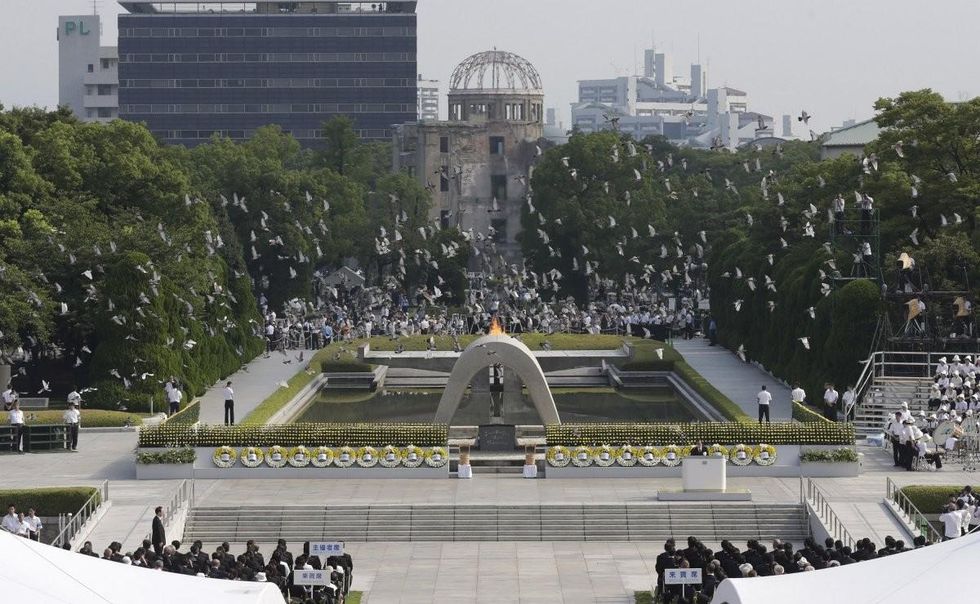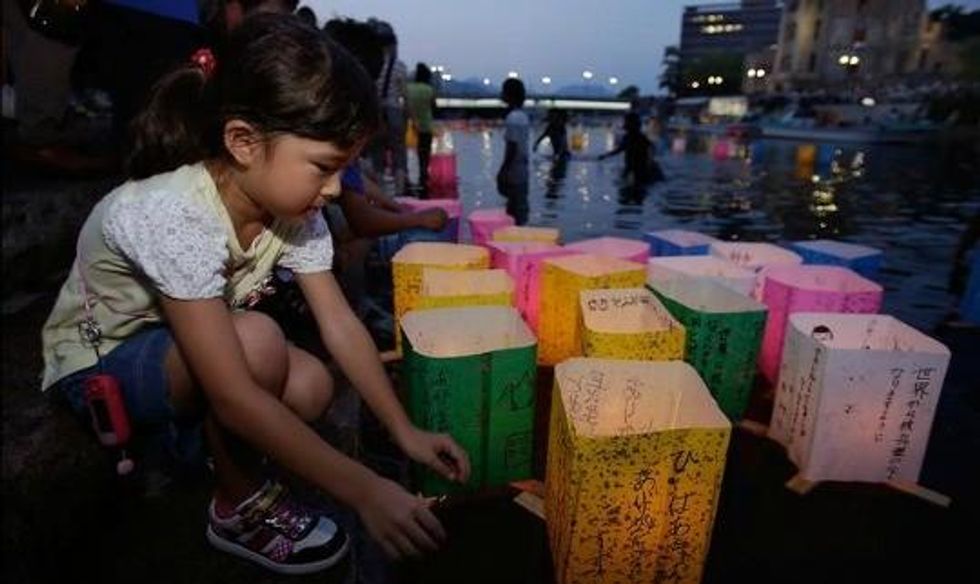

SUBSCRIBE TO OUR FREE NEWSLETTER
Daily news & progressive opinion—funded by the people, not the corporations—delivered straight to your inbox.
5
#000000
#FFFFFF
To donate by check, phone, or other method, see our More Ways to Give page.


Daily news & progressive opinion—funded by the people, not the corporations—delivered straight to your inbox.

The crowd came together for the annual ceremony at Hiroshima's Peace Memorial Park, which sits near the site of the nuclear attack that took the lives of over 140,000 people near the end of World War II.
"The atomic bomb is the ultimate inhumane weapon and an absolute evil," said Hiroshima mayor Kazumi Matsui to the crowd of nearly 50,000 which included many of the aging victims who survived the attack.
Matsui continued by championing those survivors--"who know the hell of an atomic bombing"--for their continued fight against the "evil" of nuclear weapons.
Matsui also criticized the current government headed by Prime Minister Shinzo Abe for its plans to sell nuclear power technology to India, one of four countries that have not signed the Treaty on the Non-Proliferation of Nuclear Weapons.
"The government's ongoing negotiations may bring economic benefits to Japan and India, but they will hamper efforts to eliminate nuclear weapons," said Matsui.
Matsui also tied fallout from the atomic bomb to the ongoing catastrophe at the nuclear power plant in Fukushima and the government's push to restart Japan's other nuclear reactors.
Matsui stated, "This summer, eastern Japan is still suffering the aftermath of the great earthquake and the nuclear accident. The desperate struggle to recover hometowns continues. The people of Hiroshima know well the ordeal of recovery."
"We urge the national government to rapidly develop and implement a responsible energy policy that places top priority on safety and the livelihoods of the people," Matsui said.
Most of Japan's nuclear power plants were taken offline following Fukushima's meltdown. The plant's operator TEPCO has failed to this day to maintain stability at the plant and released a statement on Tuesday warning that it is struggling in its latest efforts to stop radioactive groundwater from flowing from the plant into the sea.
Abe also spoke at the ceremony but he did not mention Fukushima nor his current plans to sell nuclear power technology to India.

_______________________
Political revenge. Mass deportations. Project 2025. Unfathomable corruption. Attacks on Social Security, Medicare, and Medicaid. Pardons for insurrectionists. An all-out assault on democracy. Republicans in Congress are scrambling to give Trump broad new powers to strip the tax-exempt status of any nonprofit he doesn’t like by declaring it a “terrorist-supporting organization.” Trump has already begun filing lawsuits against news outlets that criticize him. At Common Dreams, we won’t back down, but we must get ready for whatever Trump and his thugs throw at us. As a people-powered nonprofit news outlet, we cover issues the corporate media never will, but we can only continue with our readers’ support. By donating today, please help us fight the dangers of a second Trump presidency. |

The crowd came together for the annual ceremony at Hiroshima's Peace Memorial Park, which sits near the site of the nuclear attack that took the lives of over 140,000 people near the end of World War II.
"The atomic bomb is the ultimate inhumane weapon and an absolute evil," said Hiroshima mayor Kazumi Matsui to the crowd of nearly 50,000 which included many of the aging victims who survived the attack.
Matsui continued by championing those survivors--"who know the hell of an atomic bombing"--for their continued fight against the "evil" of nuclear weapons.
Matsui also criticized the current government headed by Prime Minister Shinzo Abe for its plans to sell nuclear power technology to India, one of four countries that have not signed the Treaty on the Non-Proliferation of Nuclear Weapons.
"The government's ongoing negotiations may bring economic benefits to Japan and India, but they will hamper efforts to eliminate nuclear weapons," said Matsui.
Matsui also tied fallout from the atomic bomb to the ongoing catastrophe at the nuclear power plant in Fukushima and the government's push to restart Japan's other nuclear reactors.
Matsui stated, "This summer, eastern Japan is still suffering the aftermath of the great earthquake and the nuclear accident. The desperate struggle to recover hometowns continues. The people of Hiroshima know well the ordeal of recovery."
"We urge the national government to rapidly develop and implement a responsible energy policy that places top priority on safety and the livelihoods of the people," Matsui said.
Most of Japan's nuclear power plants were taken offline following Fukushima's meltdown. The plant's operator TEPCO has failed to this day to maintain stability at the plant and released a statement on Tuesday warning that it is struggling in its latest efforts to stop radioactive groundwater from flowing from the plant into the sea.
Abe also spoke at the ceremony but he did not mention Fukushima nor his current plans to sell nuclear power technology to India.

_______________________

The crowd came together for the annual ceremony at Hiroshima's Peace Memorial Park, which sits near the site of the nuclear attack that took the lives of over 140,000 people near the end of World War II.
"The atomic bomb is the ultimate inhumane weapon and an absolute evil," said Hiroshima mayor Kazumi Matsui to the crowd of nearly 50,000 which included many of the aging victims who survived the attack.
Matsui continued by championing those survivors--"who know the hell of an atomic bombing"--for their continued fight against the "evil" of nuclear weapons.
Matsui also criticized the current government headed by Prime Minister Shinzo Abe for its plans to sell nuclear power technology to India, one of four countries that have not signed the Treaty on the Non-Proliferation of Nuclear Weapons.
"The government's ongoing negotiations may bring economic benefits to Japan and India, but they will hamper efforts to eliminate nuclear weapons," said Matsui.
Matsui also tied fallout from the atomic bomb to the ongoing catastrophe at the nuclear power plant in Fukushima and the government's push to restart Japan's other nuclear reactors.
Matsui stated, "This summer, eastern Japan is still suffering the aftermath of the great earthquake and the nuclear accident. The desperate struggle to recover hometowns continues. The people of Hiroshima know well the ordeal of recovery."
"We urge the national government to rapidly develop and implement a responsible energy policy that places top priority on safety and the livelihoods of the people," Matsui said.
Most of Japan's nuclear power plants were taken offline following Fukushima's meltdown. The plant's operator TEPCO has failed to this day to maintain stability at the plant and released a statement on Tuesday warning that it is struggling in its latest efforts to stop radioactive groundwater from flowing from the plant into the sea.
Abe also spoke at the ceremony but he did not mention Fukushima nor his current plans to sell nuclear power technology to India.

_______________________